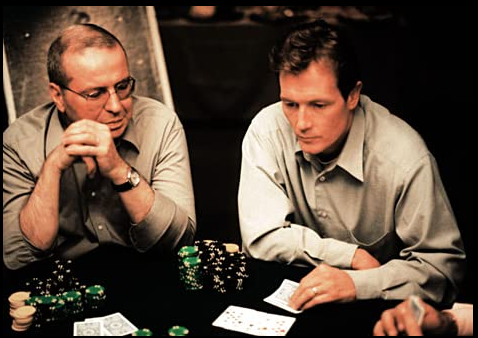Television Review: The Happy Wanderer (The Sopranos, S2X06, 2000)

The Happy Wanderer (S02E06)
Airdate: February 20th 2000
Written by: Frank Renzulli
Directed by: John Patterson
Running Time: 51 minutes
The task of describing an episode of The Sopranos in simple terms is a daunting one, as the complexity and depth of the show's storytelling often defy straightforward summarisation. However, if one were to attempt to encapsulate the essence of the sixth episode of Season 2, The Happy Wanderer, it could be argued that it is, in many ways, a "Very Special Episode" that shines a spotlight on the dangers of compulsive gambling and the devastating effects it can have on individuals, their relationships, and their families.
The episode's begins on a seemingly innocuous note, with Tony Soprano escorting his daughter Meadow to a college presentation at her high school. It is here that he encounters an old friend, David "Davey" Scatino (played by Robert Patrick), the owner of a sports goods store, who is also a parent at the school. As the story unfolds, it becomes clear that Davey's son Eric (played by John C. Hensley) is a friend of Meadow's, and the two are set to perform a duet together at the school's cabaret show. However, beneath the surface of this pleasant façade, Davey is hiding a dark secret: he is a compulsive gambler who has become deeply embroiled in a cycle of debt and dependence. His involvement in small-time poker games organised by Richie Aprile has left him owing a substantial amount of money, and Richie has subsequently barred him from participating until the debt is repaid.
In a desperate bid to recoup his losses and pay off his debt, Davey turns to his old friend Tony, seeking to buy his way into the "Executive Game", a high-stakes poker game that was originally set up by Tony's father Johnny and Uncle Junior. The game, which takes place in a seedy motel owned by Hillel Teitelman, attracts a number of high rollers, including a cameo appearance by Frank Sinatra Jr. playing himself, a nod to his father's alleged connections with the Mafia. Despite Tony's repeated warnings that the game is not suited to Davey's skill level or financial situation, he eventually relents and allows his friend to participate, after being offered $5,000. Initially, Davey experiences a winning streak, but his fortunes soon take a turn for the worse, and he accumulates a staggering debt of $45,000 before the night is out. The situation takes a turn for the worse when Richie appears, furious at Davey's brazenness, and causes a scene, prompting the other players to leave. In the aftermath, Tony punishes Richie for his outburst by taking over Davey's debt.
Soon, it becomes clear that Davey is in way over his head, and his attempts to pay off his debt only lead to further trouble. Even Artie, when approached for a financial favour, refuses to help, recognising that he would only be drawn into someone else's financial black hole. When Davey predictably fails to come up with the money, Tony reacts with brutal force, savagely beating his old friend. In a desperate bid to cover his debt, Davey takes the drastic step of giving Tony his son Eric's 1996 Nissan Pathfinder, a move that will have far-reaching consequences. When Tony later gives the vehicle to Meadow, she is horrified to recognise her friend's car, and before she has a chance to explain the situation, Eric reacts by severing their friendship and walking out of the cabaret show. Ironically, this turn of events ultimately helps Meadow, as she is able to perform a solo part that she had previously prepared, which will aid her college application.
When focusing on Davey's storyline, The Happy Wanderer excels as an episode that captures the tragic trajectory of addiction and its impact on relationships. The writing is sharp and insightful, complemented by strong performances—particularly from Robert Patrick—who initially seems an unconventional choice for a character entrenched in the Mafia's world but ultimately delivers a poignant portrayal of despair and desperation.
However, when the narrative shifts away from Davey's plight, the episode falters somewhat. The subplots involving Tony's therapy sessions with Dr. Melfi reveal his underlying resentments towards those who appear untroubled by psychological burdens. These moments serve to explore Tony's character but feel somewhat disconnected from the main storyline about gambling addiction. Additionally, revelations about Tony's mentally challenged brother who died in an institution seem tacked on and do little to advance the overall plot. Similarly, the subplot concerning Barbara’s father-in-law serves primarily as a vehicle for illustrating Tony's ongoing resentment towards Livia and Janice’s manipulations regarding Richie.
In essence, while The Happy Wanderer shines when it remains anchored in Davey's narrative arc—delivering both humour and tragedy—it becomes less engaging when it diverges into ancillary plots that lack depth or relevance. The episode effectively showcases how gambling can devastate lives and relationships while also highlighting Tony's complex psyche as he grapples with his own issues of power and control.
RATING: 6/10 (++)
Blog in Croatian https://draxblog.com
Blog in English https://draxreview.wordpress.com/
InLeo blog https://inleo.io/@drax.leo
Hiveonboard: https://hiveonboard.com?ref=drax
Rising Star game: https://www.risingstargame.com?referrer=drax
1Inch: https://1inch.exchange/#/r/0x83823d8CCB74F828148258BB4457642124b1328e
BTC donations: 1EWxiMiP6iiG9rger3NuUSd6HByaxQWafG
ETH donations: 0xB305F144323b99e6f8b1d66f5D7DE78B498C32A7
BCH donations: qpvxw0jax79lhmvlgcldkzpqanf03r9cjv8y6gtmk9